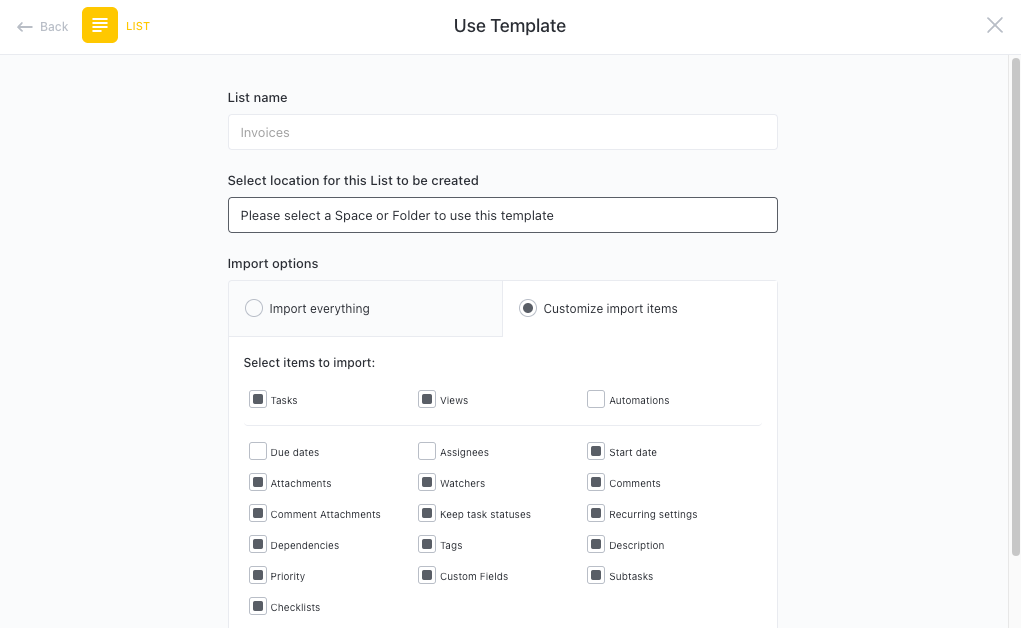City council meetings are the heartbeat of local governance, where decisions are made that directly impact the lives of citizens. But keeping these meetings organized and productive can be a challenge without a clear agenda in place. That's where ClickUp's City Council Meeting Agenda Template comes to the rescue!
With ClickUp's template, city council members and administrative staff can:
- Outline and structure meeting topics, presentations, and discussions
- Collaborate and share agenda items with ease
- Keep track of important deadlines and milestones
Stay in control of your city council meetings and make every session count with ClickUp's City Council Meeting Agenda Template. Get started today and make your community's voice heard!
Benefits of City Council Meeting Agenda Template
City council meetings play a crucial role in shaping the future of a city. With the City Council Meeting Agenda Template, you can:
- Streamline meeting preparation by clearly outlining the topics and presentations that need to be covered
- Ensure all important issues are addressed and nothing falls through the cracks
- Keep meetings focused and on track, saving time and maximizing productivity
- Increase transparency and accountability by providing a clear agenda for public viewing
- Improve communication and collaboration among council members and administrative staff
Main Elements of City Council Meeting Agenda Template
Stay organized and efficiently plan your city council meetings with ClickUp's City Council Meeting Agenda template!
- Custom Statuses: Keep track of the progress of each agenda item with customizable statuses, such as Pending, In Progress, and Completed.
- Custom Fields: Capture all the necessary details for each agenda item using custom fields like Agenda Item Title, Presenter, Time Allotted, and Discussion Notes.
- Different Views: Access your meeting agenda in various views, including the List View for a comprehensive overview, the Board View for a visual representation, and the Calendar View for scheduling and tracking upcoming meetings.
With ClickUp's City Council Meeting Agenda template, you'll have all the tools you need to streamline your meeting preparation and keep everyone on the same page.
How to Use Meeting Agenda for City Council Meeting
If you're tasked with organizing a City Council meeting, it can be overwhelming to create an agenda that covers all necessary topics. But with the City Council Meeting Agenda Template in ClickUp, you can streamline the process and ensure that all important matters are addressed. Follow these steps to effectively use the template:
1. Determine the meeting objectives
Before creating the agenda, it's important to establish the goals and objectives of the meeting. Are you discussing new policies, reviewing current projects, or addressing community concerns? Clearly defining the objectives will help you structure the agenda and allocate appropriate time for each item.
Use a Doc in ClickUp to outline the meeting objectives and gather input from relevant stakeholders.
2. Identify key topics and prioritize
Next, identify the key topics and issues that need to be discussed during the City Council meeting. Start with the most pressing matters and arrange them in a logical order. Consider the time constraints and allocate sufficient time for each topic to ensure thorough discussion and decision-making.
Create tasks in ClickUp to represent each agenda item and assign priority labels to indicate their importance.
3. Include necessary reports and documents
To facilitate informed discussions, include any relevant reports, documents, or data that Council members need to review prior to the meeting. This could include financial reports, project updates, community feedback, or any other information that supports decision-making.
Attach files to each agenda item in ClickUp to ensure easy access and reference during the meeting.
4. Assign speakers and time limits
Determine which Council members or staff members will be responsible for presenting each agenda item. Assigning speakers ensures that discussions are organized and led by the appropriate individuals. Additionally, set time limits for each item to keep the meeting on track and allow for equal participation.
Use custom fields in ClickUp to assign speakers and set time limits for each agenda item.
5. Send out the agenda and prepare meeting logistics
Once the agenda is complete, distribute it to all attendees in advance of the meeting. This gives everyone an opportunity to review the topics and come prepared with any necessary information or questions. Additionally, ensure that all logistical details are in place, such as meeting location, technology requirements, and any special accommodations needed.
Send the agenda via Email in ClickUp and use Automations to schedule reminders and updates for all attendees.
By following these steps and utilizing the City Council Meeting Agenda Template in ClickUp, you can streamline the meeting preparation process and ensure that all important topics are addressed in an organized and efficient manner.

Get Started with ClickUp’s City Council Meeting Agenda Template
City council members and administrative staff can use this City Council Meeting Agenda Template to streamline the process of planning and conducting city council meetings.
First, hit “Add Template” to sign up for ClickUp and add the template to your Workspace. Make sure you designate which Space or location in your Workspace you’d like this template applied.
Next, invite relevant members or guests to your Workspace to start collaborating.
Now you can take advantage of the full potential of this template to plan and execute city council meetings effectively:
- Use the Agenda View to outline the topics and discussions that need to be addressed during the meeting
- The Presentations View will help you keep track of any documents or slideshows that need to be presented
- Use the Participants View to manage the attendance of council members and other stakeholders
- The Discussions View provides a dedicated space to record and follow up on important discussions and decisions
- Organize agenda items into different statuses to indicate their progress, such as Pending, In Progress, and Completed
- Assign tasks and deadlines to council members to ensure accountability and timely completion
- Monitor and analyze meeting outcomes to identify areas for improvement and track progress over time








